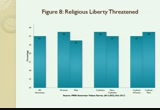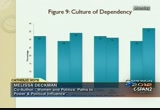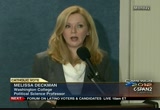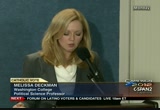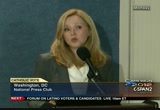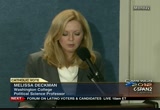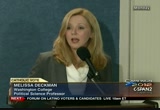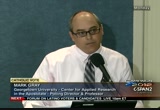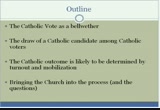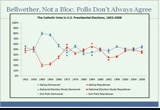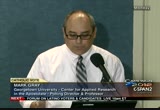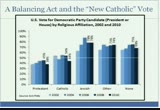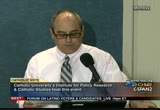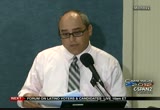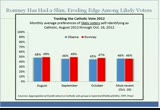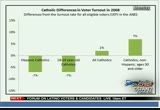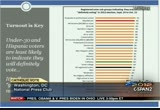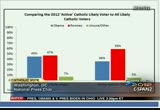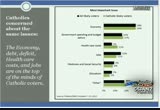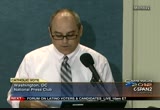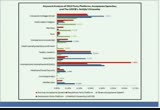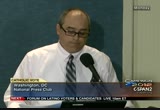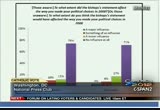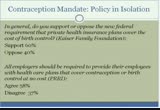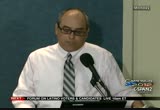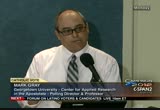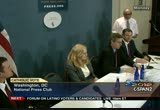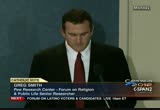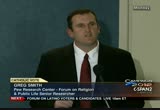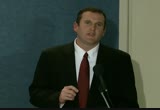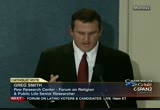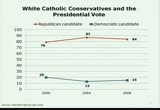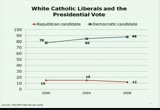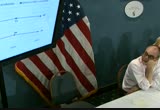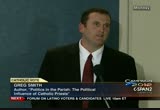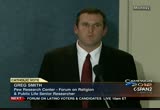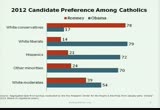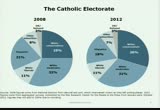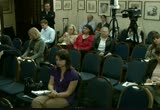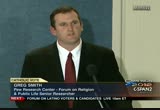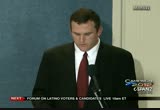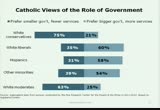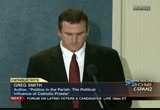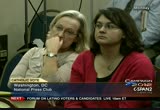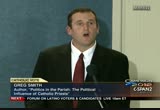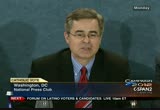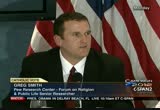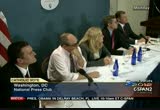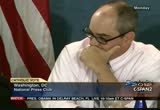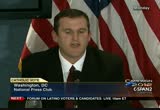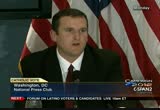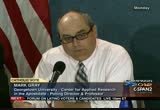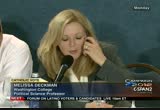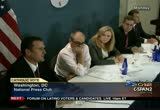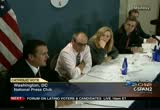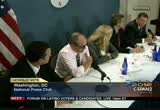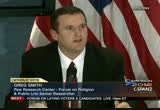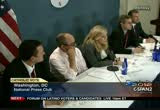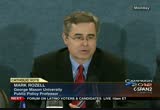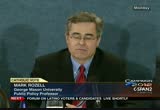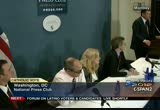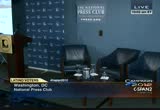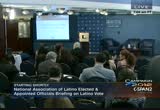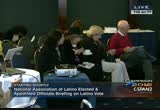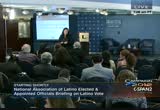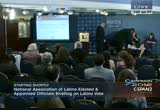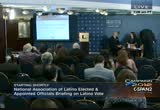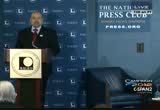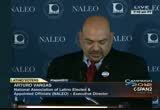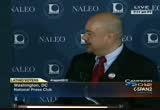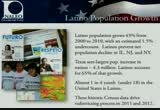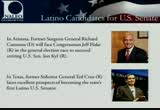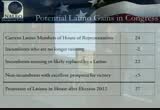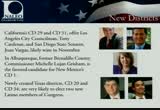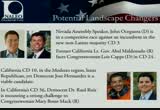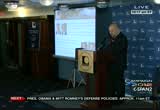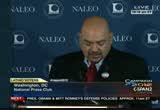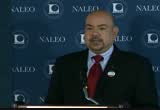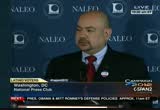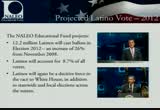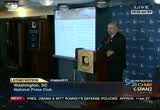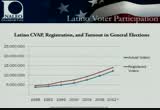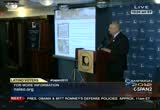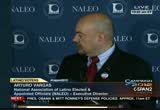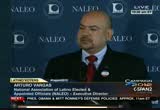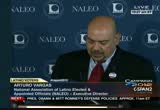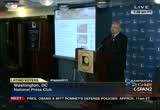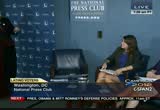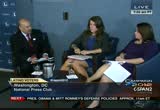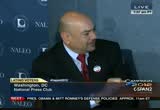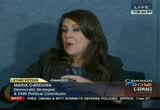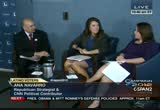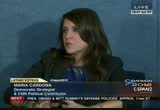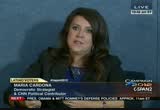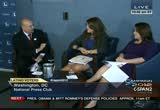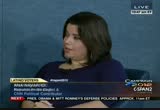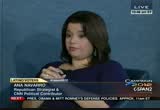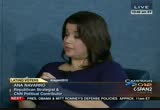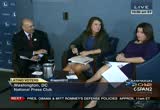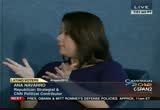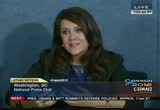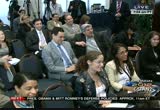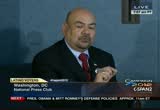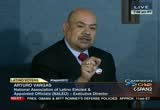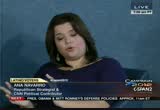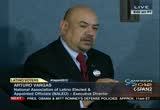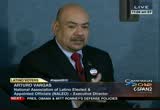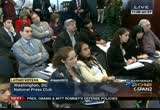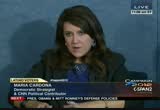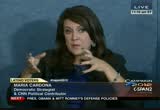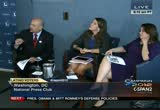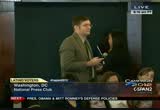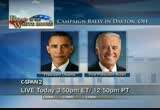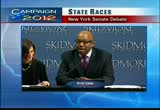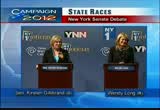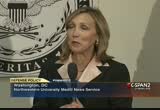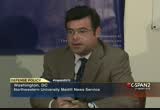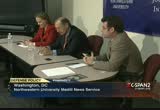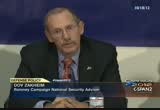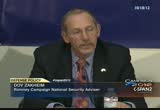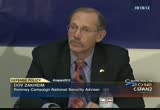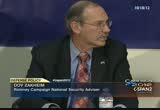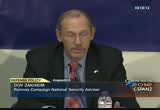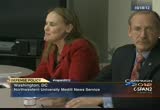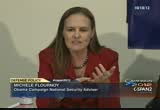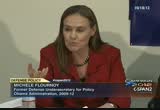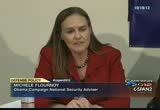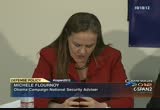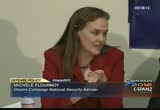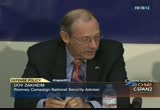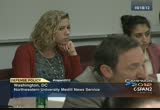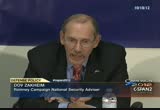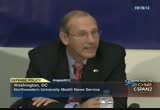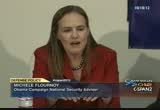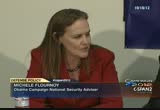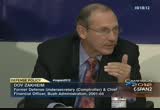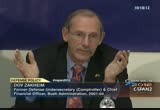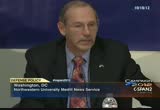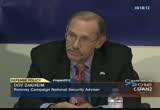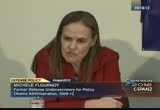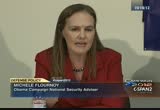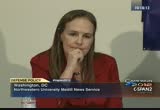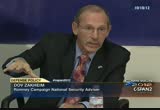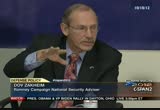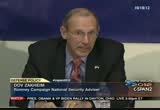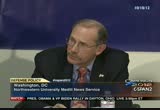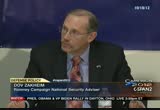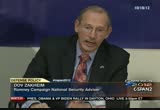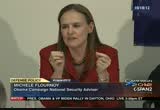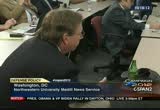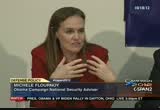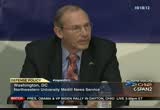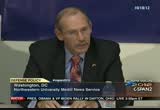tv U.S. Senate CSPAN October 23, 2012 9:00am-12:00pm EDT
9:00 am
and not just the catholic bishops. so somewhat surprisingly coming given the majority of americans say that they agree with the mandate, we still find that a majority of americans also believe religious liberty is threatened, somehow the data are at odds quite a bit here. what's interesting though is that a majority, a slight majority of both men and women, catholics and non-catholics and catholic women and men feel that religious liberty is threatened. so that message seems to resonate in, with quite a few americans. last slide i want to talk about, the idea of a culture of dependency, getting back to the social welfare issue. most studies of the gender gap show that attitudes about social welfare policy are what drives the gym to get. many catholic groups are most
9:01 am
notable in networks led by sister simone and the nuns on the bus have been vocal critics of the ryan budget which would cut spending of social services. republicans have been heavily influenced by the tea party movement in the past three years, and the tea party espouses of course that government should be far less responsible for providing the service. they believe that when the government provides social welfare it creates a culture of dependency among americans but i was struck that paul ryan use those words talk about welfare reform. so the american values survey asked americans whether they were more likely to agree that government policy and helping the poor served as a critical safety net or whether they create a culture of dependency where people are provided with too many handouts. so figure nine shows the percentage of americans were more likely to say that those policies create a culture of dependency. it's relatively few, only 32% of americans say social welfare policies create a culture of
9:02 am
dependency. there is a gender gap here as well, not surprisingly. here we find 29% of women agree that welfare creates a culture dependency compared to 34% of men. there isn't a lot of difference looking at catholics when you group them together by breaking a catholic men and women, here we see quite a significant gender gap, even larger than the gender gap among women and men. catholic men are more likely to agree with that statement and catholic women. so, to sum up here, data from public religion shows a gender gap among voters that is similar to recent presidential election. obama is pulling more support among women voters. the gap appears to be driven less by issues such as reproductive rights, abortion of course we see low salient issue for most voters including when by instrument more bite social safety net concern.
9:03 am
at what's interesting is in recent weeks as the romney campaign has been able to close the gap despite this data showing that women are less likely to believe that programs create a culture of dependency and despite the data showing that women can more about health care as an issue. women like men are most likely to say that the economy matters in their decision, so it appears that the romney campaign and this is on how the economy is affecting women, namely that there more women in poverty under the obama administration, and the recession has hit women hard in terms of job loss. this message may be making traction among women voters. when it comes to catholics, there are several points to emphasize. while catholics overall are more supportive of obama in this day, it's large function of obama's overwhelming popularity of latino men and women. and i don't include this on the table, but there is a gender gap among the 10 catholics. the two men are less likely to support obama and women but generally speaking the vast majority of latino men are
9:04 am
supporting obama. what's driving this is immigration. for latino voters the economy was the first issue most important, but immigration was a close second. roughly one in for latino voters said in the state immigration was their major reason for going to the poll. you can see how that is going to be benefiting barack obama in this election. interestingly while why catholics are more likely to vote for romney overall. they're still a gender gap. respect to the views on abortion, health and human services birth control method, religious freedom and the culture of dependency, it appears the bishops vocal opposition to the health and human services mandate is not something most dashing most catholics from supporting. at least when supplied to catholic hospital or universities.
9:05 am
only a slight minority of catholic women and men support the health and human services mandate, if applied to churches. but catholic men are more likely to support the mandate as applied to hospitals and women which went slightly counter to the gym to get. i'm going to close with this point. i think the data your point an interesting picture of catholic women, and that catholic women are more likely to agree with the catholic church hierarchy on both justice issues and also the social issues such as abortion. this is probably because american women in general, including catholics are more religious than men and a more faithful when it comes to church attendance. this greater religious also be among catholic women may be why we're seeing a greater the slight tendency for them to oppose abortion than men and to see fewer catholic women supporting the health and human services mandate. we also are saying that you're catholic women believe that government service create a
9:06 am
culture of dependency compared to catholic men. which again is in line with the church's social justice teaching. however, that the end of the day, catholic women like catholic men and black americans were generally believe the economy is still the most important issue in this presidential election. thank you. >> okay. thank you for the invitation to speak here today. we are an independent nonpartisan social science research center established in 1964. we focus on applied research for and about the catholic church. we've been tracking and aggregating catholic polling data since the primaries begin.
9:07 am
we try to track them as many sources as possible that will release topline results for catholics and we have not been any polling itself as a research organization during this election season. so i'm relying heavily on other posters here, including pew, which is always kind enough to share with us what catholics are thinking and doing in terms of the election. so i picked out for different topics that i think are interesting or important from our analysis throughout the election. these four, the first, look at the catholic vote as a bellwether vote, it is true as mark noted that often the winner of the catholic vote is the winner in the popular vote by and about 25% of voters are expected to be catholic in november. the drop of catholic candidates
9:08 am
among catholic voters can we to catholic vice presidents, vice presidential candidates which is truly a unique circumstance. we get a lot of questions at cara does this matter, does one draw catholics more than adequate the third thing would be how important is not going to be. we heard a little bit about that. hope to show you that it will likely be important in determining how the catholic vote goes. and, finally, looking at what the role the church has been this election season and how that has potentially affected the catholic vote. looking at what mark has brought a previously, this is how catholics have voted. we aggregate three polls at cara, gallup, the american national election study and the exit polls. reporters typically focus on exit polls only when trying to determine who won the quote unquote catholic vote. this is always risky.
9:09 am
exit polls have their issues, ambitious going to be even more difficult because we've got exit polls taken in a of states will be more difficult than other -- than ever to understand it will have to wait for other poster. they won't have as many interviews in it and they will have higher margins of there. for aggravation we get reported of a catholics have voted. you can see it's only been a block into elections in recent memory with john kennedy and then lbj. since then, it's fluctuated back and forth but there's been areas where the polls have agreed. so it's also elections in massachusetts candidates. one with the in 1988 where the polls don't agree on who won the catholic vote, and many other in 2004. john kerry, if you aggregate all three of these polls and average that it looks like perhaps he did win the catholic vote.
9:10 am
the fact that it's no longer a block, now what i think is more accurate to refer to as a bellwether vote, is a bit of a fluke. i don't think this is anyway deterministic. i don't expect it to always be true. and fix some of the comments of argument about the changing demographics of the catholic vote, the way in which latino catholics are more likely to support the democratic party and its candidates more heavily. as that grows and becomes a bigger part of the catholic vote i suspect it will not be as good a predictor in future elections as it has been in the past, as a bellwether. one of the things we focus on this election season is how the catholic vote is important, how it can be seen as a bellwether or swing vote. in between these different religious groups year. so these are from exit polls and elections, and you can see, this is the percentage of these groups that are supporting the democratic party candidate, either for the president or an off year election, for a member
9:11 am
of the house. you can see on the right, the furthest column to the right, those are the people with no religious affiliation. then those in other religious affiliation, heavily supporting democrats. you can see democrats haven't won protestant in the last decade. i wouldn't expect them to have any chance in this election either among protestants. the catholic vote is the one that is swinging back and forth but it's the one that is going above and below 50%. so we always cannot think of it as not only in terms of an electoral outcomes but also in terms of issues. kind of a goldilocks vote. holding these two different sites together, kind of a balance the electoral outcome. we started tracking voting preferences with republican primaries but, of course, there
9:12 am
was no sense in doing this on the democratic side. this is a unique election and since the republicans were running to catholic candidates for a time, attracted, were ahead in the polls. however, if you aggregate that every contest that exit polls but if you aggregate the contest they do, among catholic voters, well me won the catholic vote. there were 10 states where there was polling done, and in eight of those, romney won. gingrich and santorum each won one of the primaries. so what this is as with all resolve the data on john kerry is being catholic no longer matters for the catholic voter. in terms of the candidate. it mattered with jfk, but it hasn't mattered really since. and the fact that there are two vice presidential candidates here that are catholic, i don't think that it pulls the catholic
9:13 am
vote in either direction. i think democratic, catholic are very comfortable voting for joe biden and republicans are very comfortable voting for paul ryan. now, tracking here with multiple sources including many pew surveys, looking at registered voters, this is among registered voters all the way back to a year ago, if you average over the whole trend of the presidency of the lead 48%-45%. and currently it is at 50% versus 45% among registered voters. just brief periods of time when romney was basically won the nomination, he jumped ahead, and during republicans the convention he jumped it. but otherwise the president has had a pretty solid and consistent lead among registered voters. however, it's among likely voters with the president has the biggest problem. we have fewer polesitter. we have nine since august,
9:14 am
averaging by month. romney has led in seven of these and tied into. is currently tight in the most at which basically mirrors the national polls. so given the trend across polls, our interpretation is romney might have a slight edge, at this point in the election. because and decided may break his way, given the trend over time. that romney may be leading among likely voters with the president continues to lead among registered catholic voters. so saying it is all about turnout is really about turnout of specific groups. so the president's biggest problem is with catholics turning out among, hispanic catholics and young catholics. this is from the last election in 2008 from the national election study. you can see there was even a high turnout election for both of these groups, and they turned out well below the average of
9:15 am
seven percentage points below what the overall turnout was. you can see catholics overall in general have higher turnout. and the overall electorate. if you look at catholics who are non-hispanic and age 30 or overcome you have significant higher traffic the potential catholic voters to support romney are so much more likely to vote than a potential voters who support the president. you can have this distinction between president leading among registered voters but perhaps trading or even just even among likely voters. this could make a real difference in the election catholics make up one in four voters and that is the same in the swing votes. when cara run the numbers we found the most competitive states, they make up about one in four voters. this is what turnout looks like potentially among groups, this is not just catholics, everyone overall, this is some talent. those, percentage of registered voters saying he'll definitely vote, and if you look at the bottom two groups, you can see
9:16 am
the lowest likely turn out. so a 66% of registered voters 18-29 say they are definitely voting. 71% of hispanics. so compare that to republicans year, or republican groups here, those making 90,000 more in household income, married, those aged 65 or older when romney leads, protestants and christians, those are all high turnout groups versus those without religious affiliation, unmarried hispanics and young voters. and i know that i have to show this light, because the most common question you see out there is when you say the catholic vote, what about the real catholics? for many a real catholic is a catholic who attends mass every week. of course, that's not the church's definition. that's not the social scientist definition. but there's also a much smaller
9:17 am
group, only about 22% of catholics attend mass every week. so electorally it is a less powerful group when it comes to the. you can see your among all catholics likely voters, romney has a slight edge 47-45. and politico, george washington university poll. when you look at active catholics, you can see what's been brought up here, 23 percentage point advantage. what are the most important issues? this is the most recent data i can find from politico. what melissa%, the economy the number one followed i other issues that are could be considered economic, government spending and budget deficit, health care costs and jobs. so we also get a lot of questions about what's drawing catholics out, one of the important issues? they really is almost no difference between catholics and your average voter in terms of what they consider to be the most important.
9:18 am
but this is one of the more challenging things for catholics to consider. partisanship in our analysis tends to trump religious. and it's because the catholic church and its issues that it is sites the most important, tend to be divided between both parties. so the republican party is more consistent on life issues, faith-based partnerships where is the democrats would be more consistent on issues of immigration, support for poverty programs, opposition to the death penalty can't even climate change. the way i describe the catholic church is kind of 90 degrees right or left. it's got issues that are important that are in both parties. if this was europe would have more than two parties if that would allow, it would allow. doesn't happen. you would see something like a christian democratic party rise that would probably be more consistent which many european
9:19 am
catholic voters -- that choice is here american voters. i'm sorry, this is very small type, the church always puts more its statement on issues issue. if the document, what was released this year was the same in 2008 which a new forward. we did a cost analysis. we look at the romney acceptance speech, the obama acceptance speech, how prickly topics are coming up and the church is different in both parties. it focuses on religion more than either the republicans of the democratic party which he would respect. -- expect the abortion is used more than either of the parties. this might be the most surprising. out of both parties there appears to be only church, the church seems to be the one that talks about for more than either of those parties.
9:20 am
what you see as republicans, although it is an important part of the platform, they don't talk about as much. not as much as they have in previous election seasons. the same goes for the democrats. even though you're going to see some mention on the platform, you don't see it spoke about in campaign speeches. for both of these parties, they do an enormous amount of polling. does moore point to in this election than any in the past. from all that testing i'm betting there's one phrase that came up more than any other. middle-class. middle-class, middle class, middle class. somehow tonight they can do so find a way to get in the foreign policy debate. but the poor are being left out in that you are reading what the churches sing is an important issue. etiquette many catholics are. how many catholics use or even know about this? cara did this survey in 2011, and we describe what it is. we asked them if the recall
9:21 am
hearing about it. you can see 54% said no. 30% said maybe. i'm not sure, it sounds perhaps familiar, but 16% said that they had heard about faithful citizenship. now, i don't want to downplay that 16% there. that's about 8 million people. social networks matter. we asked to what extent did the bishops statement affect the way you make your political choices in 2008. of those who were aware of it. those who were not aware, we so what extent you think the bishops it would've affected the way you make a political choice in 2008. you get a very similar breakdown. about seven in 10 or more said they will be no influence at all. but about a quarter in both groups say that it would have some influence.
9:22 am
including some small percentage, 4% in each of you said it would be a major influence on their decisions. so it is, it's almost trickle-down campaign advice. you're hoping to get out there to the most influential people and they pass it on and that's why that made, i'm not sure i heard about. that might represent a bigger percentage than those who recall having heard the name. turning finally to the conscious effort mandate. i'm not saying that this is sorted not going to be a session on how to work your questions, but it is i think instructed that the word of questions did have -- look at several differences here. collected by melissa data, and the first is two examples, she has several but these are two examples. these were in february before the accommodation was made.
9:23 am
when this was still an issue, before it had really dropped into its trenches on both sides were people are still thinking about it, or get catholic voices on the far left, when the msnbc, read article that look like it could've been from the bishops on this issue, criticizing it. the first question is in general, do you support or oppose a new federal requirement that private health insurance plans cover the cost of birth control? 60% of catholics supported. 40% opposed. all the employer should be required to provide their employees with health care plans that cover contraception or birth control at no cost. are sent to 37%. again, i'm not saying that the next slide includes questions how i think think should be worded, but i think it's almost an experiment. is almost instructed to see how things change when you put church into the question. so do you think religiously
9:24 am
affiliated colleges and hospitals should be required to provide their employers health care plans that cover contraception or birth control at no cost or not? there you see the catholic vote flit. you have religiously affiliated institutions there, 45% yes, 52% no. the second question which, working gets a little bit difficult here, as a survey research you would be concerned about some of these words but the requirement to provide contraceptives for women violates deeply held beliefs of some religious organizations. should the government still require them to provide coverage for contraceptives? there you see yes, 35%. no, 65%. what we basically see is what you introduce church or religious organizations into these questions, it appears it slips. it's enough of an influence that it flips support for this particular issue. if it's just policy, no context,
9:25 am
catholic support. once you introduce that context, the majority flipped. there is something here, some sort of influence. there are many catholics who probably use contraception, and however, are opposed this policy based on the issue of i don't want the government telling the church it has to do something. and i think that's what we're seeing in the numbers. at the same time i don't think that this issue is going to determine the outcome of the catholic vote in this election. as we saw from u.s. people the most important issue, this isn't it. it interesting for the church, interesting for social scientists to look at this but this won't decide this election. it goes back to my second point. it's going to be turnout and who has the best ground game, who's going to be able to mobilize and there's some interesting stories out there about parties and trying to work with parishes and catholic organizations, and that's in the in going to be determining the outcome of this election for the catholic vote.
9:26 am
thanks. >> and now greg smith will make his presentation. >> well, good afternoon. it's a real pleasure to be here, and i'm grateful for the opportunity to come and share some of our research. before i dig into some of the highlights of the recent analysis we conducted of what's commonly called the catholic swing vote, let me just say a word or two about the pew forum on religion and public life. as you may know, we are a project of the pew research center, which is a nonpartisan, nonprofit organization.
9:27 am
we have a strict non-advocacy stance which means we don't take positions on political issues. would also don't take positions on religious issues. we don't endorse candidates for public office or political parties. we don't accept funding from or collaborate with advocacy groups. instead, our goal is to try and provide an objective, accurate, up-to-date information on important issues at the intersection of religion and public life. and certainly, understanding the features and the contours of the catholic cop populates of the can't vote is eight key facet of understand religious life in the united states. there are any number of ways the catholic vote might be analyze, and without the chance to see some of those today. what i'd like to do is present some of the highlights of the report we recently published that as i mentioned takes up the question of whether or not catholics constitute a swing
9:28 am
vote. and by swing vote, i mean closely divided and capable of swinging from one party to the other from election to election. i do know that there are other ways to use this term, but that's how i would use it today. and as you all know, we often hear catholics referred to as a swing vote, or a crucial swing vote. and in some sense there's good reason for this. in an election, catholics have cosseted a very large group. they account for about a quarter of the electorate in recent years. they've also been closely divided in recent elections, as you can see here. and they have generally tended to side with the winning candidate, although as mark points out, it's tough to say that they always do that. that can be a bit of an overstatement. but in general, they are as mark pointed out a good bellwether. but as we've heard today, catholics are also a very diverse group.
9:29 am
there are multiple catholic constituencies, and what we've tried to do in our new analysis is to take up the question of the extent to which catholics constitute a swing vote. and if it's not quite right to think of catholics as a whole as a swing constituency, and i think that it's not quite right to think of them that way, is there a subgroup of catholics that could be seen as a swing voter group? our analysis shows as i mentioned that most catholics are not swing voters. most are either clearly and consistently republican, or clearly and consistently democratic. it's really only a minority of catholics, albeit a fairly substantial minority, it's really a minority of catholics that is evenly divided and prone to swinging back and forth from election to election. so what we did to try to get a handle on this was to analyze catholic voters by race and by
9:30 am
political ideology. now keep in mind that our goal here was and, really wanted to explain why catholics vote the way they do. instead, it was to try and assess the size and characteristics of the subgroup of catholic voters that exhibits the characteristics of a swing constituency. so we divided catholics by race and ideology into five groups. why catholics who describe themselves as political conservative, white catholics identify themselves as political moderates, white catholic liberals, hispanic catholics, and other minority catholics. now, most of these groups are firmly planted within one part of the coalition or other. take white catholic conservatives, for instance. this group is strongly and consistently republican. in 2000, they supported bush over gore by 59 points.
9:31 am
and in 2004, white catholic conservatives voted for bush over john kerry, a fellow catholic, by a whopping 74-point margin. and again in 2008, this group strongly backed the republican john mccain over barack obama by almost 70 points. clearly, this is not a swing group. it's not at all closely divided, and it absolutely does not swing back and forth between the two parties from election to election. now, at the other end of the political spectrum, we have white catholic liberals, also not a swing group. in 2000, white catholic liberals voted for gore over bush by more than five to one. we saw the same kind of margin in 2004, and the 2008, white catholic liberals voted for obama over john mccain by more than 71. obviously, here in this is not a swing group. it's not closely divided and it
9:32 am
is not prone to swing from one party to the other. hispanic catholics tend to resemble white catholic liberals and their voting patterns. they are not quite as one-sided, but we do see a similar pattern. in 2000, about two-thirds of hispanic catholics voted for gore over bush, and an identical number supported john kerry over bush in 2004. in 2008, three quarters of the given catholics voted for obama compared with one quarter who supported john mccain. we see the same kind of pattern among other non-hispanic minority catholics. in each of the last three elections, roughly seven in 10 in this group, have voted for the democratic presidential candidate while about one quarter or less have voted for the republican. so clearly, white catholic and conservatives are not swing voters. they are staunch republican voters. and white catholic liberals are not swing voters.
9:33 am
now or hispanics or other minority catholics. they are staunch democratic voters. now that leaves us by process of elimination with white catholics to describe themselves as political moderates. they are the only group of catholics that has been divided in recent elections. in 2000, about half of white catholic moderates voted for bush, and the other half voted for gore. and in 2004, we see the same kind of thing, about half a white catholic moderates voted for bush, the other half voted for john kerry. now, in 2008, this group of white catholic moderates, so long strong in a democratic direction. 58% of the vote for obama, to 41% for mccain. now, that is a very big swing. in 2004, this group supported republicans over the democrats by five percentage points. in 2008, they favor the democrats over the republican by
9:34 am
17 points. now that's a swing of 22 points in the course of one election to the next, and that is a much larger swing and we see him again any of the other catholic subgroups. so this is your key group of catholic swing voters, white catholic moderates are the most closely divided and the most prone to swing from one party to the other in any given election. now, we've continued to see these same patterns in polling that has been conducted over the course of 2012 by my colleagues at the pew research center. these figures and the rest i will show on this chart are not, they are not our most recent data on catholics. rather, they come from aggregated surveys that have been conducted over the course of 2012. and the reason for that is aggregating data that way is the
9:35 am
only way to be able to generate a case count that is large enough to look at some of the smaller groups. so these findings don't necessarily reflect the latest development in the campaign. most obviously the presidential and vice presidential debates. but they are illustrative i think for thinking about the nature of the catholic swing vote. now, you can see that white catholic conservatives have been strongly and from these corner. they are expressing support for him over obama by more than a four to one margin this year. white catholic liberals, hispanics and other minority catholics have essentially been the mirror image of white conservative catholics. so these groups have been firmly in obama's camp. white catholic moderates by comparison have been much more evenly divided. now, to be sure, the balance of opinion among white catholic
9:36 am
moderates this year has leaned towards obama as opposed to romney, but clearly they are much for closely divided in any of the other catholic voter subgroups. so, most subgroups of catholic voters are not really swing voters. it's really just white catholic moderates that can be thought of as a swing voter group. now, this raises the question, how large can how politically influential are these groups? visa charged report on the size of these subgroups in the 2008 election, based on exit polls of voters, and then today in 2012, from polling that we've conducted among registered voters. you can see that in 2008, white moderates were the single largest group of catholic voters. but they were a minority. about a third of catholic voters were white moderates, and we see the same thing reflected in our polling so far this year.
9:37 am
then you have white catholic conservatives. and they accounted for about a quarter of the catholic electorate in 2008, and about three in 10 of the catholic voters that we interviewed so far this year. hispanic catholics account for about one-fifth of the catholic vote, while white liberals and non-hispanic minority catholics each account for about one-tenth of the catholic vote. so if you put all of this together, it suggests that about a third of catholic voters are in a pretty strong republican subgroup, the white catholic conservative group. another third or so, a third, four in 10 or so, are in firmly democratic subgroups, white catholic liberals, hispanics and other minority catholics. then have about a third of the catholic vote that consists of this closely divided swing group, white catholic moderates.
9:38 am
now, to get a better sense of what's going on here, what's motivating these voters, we also took a look at some of the issue positions of these groups. and it probably won't come as much of a surprise that white catholic conservatives are conservative. when it comes to a variety of issues, including things such as marriage. about two-thirds of white catholic conservatives oppose allowing gays and lesbians to marry legally. white catholic liberals by contrast are, you guessed it, pretty liberal on other issues. three quarters of white catholic liberals favor allowing gays and lesbians to marry legally it is also interesting i think more support and opposition to same-sex marriage among latino catholics. unfortunately, we don't have enough interviews with other minority catholics to be able to analyze their views on this issue.
9:39 am
white catholic moderates, this is interesting i think, looks much more like white catholic liberals than conservatives on this issue, two-thirds of white catholic moderates favor same-sex marriage. we see a similar pattern when it comes to use of abortion. most white catholic conservatives say abortion should be against the law in most or all cases. most white catholic moderates -- white catholic liberals take the opposite point of using abortion should be legal in most or all circumstances. and minority catholics are more divided by comparison. here again in the white catholic moderates look a lot more like liberals and conservatives. you can see there, six in 10 white catholic moderates say abortion should be legal in most or all cases. so on social issues, white catholic moderates tend to espouse pretty liberal positions.
9:40 am
what about views on the proper size and scope and role of government? here again, white catholic conservatives express a pretty conservative point of view. about three quarters say that they prefer a smaller government that provide fewer services to a bigger government that provides more services. so this is a group that consistently conservative on both social issues and on this important question about the proper role of government. white catholic liberals are, as you might have expected, more liberal on this question, as are hispanics and other minority catholics. six in 10 white catholic liberals say they prefer a bigger government that provides more services over a smaller government than does less. now, what about white catholic moderates? here, unlike what we saw when it comes to abortion and same-sex
9:41 am
marriage, white catholic moderates side with white catholic conservatives. more than six in 10 white catholic moderates say they prefer a smaller government that provide fewer services to a bigger government providing more services. so this group is pretty liberal on social issues, like abortion and same-sex marriage, but more conservative in their outlook about views of government. so what you're seeing here, which you might be seeing here are cross pressures at work, this group is conservative in some ways, liberal on others. and that might help to explain why they've been closely divided and prone to swing from one party to another in and elections. now finally let me leave you with what the data suggest about the religious attendance of these groups. we know that religious commitment, religiosity, as measured by frequency of religious attendance is a really good predictor of peoples
9:42 am
political inclinations and a bullet in -- voting behavior. this is an important characteristic to examine. this chart is a little different than the others i've shown in that its rank ordered from most frequent religious attendance to least frequent attendance. and we can see about about half of white catholic conservatives say they attend religious services at least once a week. as do 45% of hispanic catholics. among other minority catholics and oman white catholic moderates, about four in 10 say they attend mass on a weekly basis. and white catholic liberals exhibit the lowest levels of mass attendance, about three in 10 white catholic liberals say they attend religious services weekly. so white catholic conservatives certainly don't have a monopoly on religious attendance, but they do report attending mass more frequently than many of the other catholic voter groups.
9:43 am
i'll stop there. i hope that this information might help to inform thinking about the catholic swing vote. now, i do realize, especially given the increasing ideological homogeneity of the parties, i do realize that some of this analysis might seem pretty obvious. i mean, i know that it's not exactly earth shattering that conservatives tend to vote for republicans and liberals tend to vote for democrats, and moderates are more divided. but with that said, i do think that these findings were they can be helpful, not so much for understanding why catholics vote the way they do, but instead for assessing the size and characteristics of the catholic swing group that we hear so much about. most catholics really are not in a swing voter group. post are in groups that are clearly republicans are clearly democratic. it's really a minority of
9:44 am
catholics, why catholics moderates who are closely divided swing vote. the potential electoral importance of this group shouldn't be minimized. they give account for about a third of the catholic vote, and a 2008 be accounted for about 8% of the electorate overall. but it is worth keeping in mind that they are just one slice of the catholic elected but i'll leave it at that and look forward to your questions. >> thank you, craig, and thank you to all the members of the panel for the good presentation, and some really interesting findings. we finished a couple minutes ahead of our planned schedule, which i if you ever attend an academic program before and seen the presentation by the fares scholars, you know this is quite an accomplishment. so that having been said, we have some good time for questions and answers, and i like to open the floor for any questions. yes, and please come to the microphone and identify
9:45 am
yourself. spent i am appalled with the "washington examiner." greg, how is the moderate catholic swing vote when, if obama won 70% in the last election, he's up 50% in this election, isn't that a trend? >> well, i think we'll have to wait and see what the outcome of this years election is to know if it is a trend. you know, while obama did when they come on this group in 2008, there very closely divided into two elections before that. the other thing that's interesting that i didn't point out in my remarks that that might speak to some of your question is that we have to keep in mind that these groups as defined by political ideology, ideology, they are not static. they can change. ..
9:46 am
>> that also might be behind some of the trend. while the white catholic moderate group has shrunk, the two groups that have grown are the conservative group, um, not by as much as the moderates have shrunk, but conservatives have seen their share of the catholic vote tick up, as have hispanic catholics, their share has also increased. so we'll have to see if it's a trend. i can't wait to find out. >> and i should mention other panelists can jump in on any question even if it's directed to a particular panelist.
9:47 am
another question, please? >> yeah, i have a question for the whole panel. is there another demographic that are at that 50% line, mainline protestants, some other group? it seems to me that in these surveys sometimes what we forget is there's a campaign. so if you're obama, and you look at the numbers of how badly you do among white evangelicals, you're not going to advertise on evangelical lines. conversely, i don't think mr. romney should be taking out ads in the forward or jewish publications because he's 80/20. how much of it is, then, the dynamic of a campaign has to decide to shape the content of its message and where to air its message, and it turns out the one group that kind of mirrors the general electorate is catholics? >> well, i think you're right to point out that the country is
9:48 am
pretty polarized not just on political lines, but also on religious lines. we do see that there are, um, several religious and racial, religious and racial groups that are clearly on the democratic side of the aisle. perhaps the most prominent of these are people who say they have no religion. this is a, this is a large and growing group, about one-fifth of the american population describes themselves as atheist, agnostics or just nothing in particular, and that group is strongly democratic. in fact, i think sometimes it goes overlooked. in 2008 religious nuns, the religiously unaffiliated were as strongly democratic as white evangelicals are republican. you also have black protestants who are strongly democratic, jewish voters tend to be strongly democratic. on the right, on the other side
9:49 am
of the political spectrum you have white evangelical protestants have been strongly republican for years, and that leaves catholics kind of in the middle when considered as a whole. but there again i think one of the things that happens as you alluded to is that these groups are in the middle in part because they are reflective of the larger population. they are large and reflective of the larger population. and so in that sense those are the two groups that are often looked to as a swing constituency or as a bellwether group. um, in terms of the impact of campaigns and what difference it makes politically, um, one of the things you have to keep in mind is that while i think the term swing voter is most often used to describe those who are closely divided, you also have to keep in mind that especially in a closely-divided electorate, um, changes on the margins among any group no matter what their proclivities are are politically
9:50 am
consequential. so if evangelicals even though they're strongly republican and there's no indicator that that won't continue to be true this year, if they move even a little bit in the democratic direction, that can have big political consequences. the same thing is true on the other side. if you have strongly democratic groups who remain that way, if they move a little bit in the republican direction, that can be important as well. so the campaigns can have an impact not just among the closely-divided groups, but among any group. >> i would just follow up and, what greg said and note that the nuns now are just as important to president obama as catholics were to john f. kennedy. it's the same mathematical electoral weight. i'd also note that mainline protestants are also distinct from evangelicals, and that's another group where it's closely divided like catholics. but i'm not sure that any of that matters because of the electoral college, and instead of looking at demographics and trying to find this group is more evenly split than the
9:51 am
other, we do it by state. so it's where a tate's balance is close -- state's balance is close and then go in and try to narrowly figure out what can we win in that state, and that's just a characteristic of how we have our elections. >> what i'm struck by when it comes to religion in campaigns this time is the extent to which, for example, the obama campaign has really tried not to outreach to groups that it pretty much has written off. so in 2008 there was a lot written about the outreach to evangelicals, especially young voters, and it didn't turn out to matter at all. evangelicals are solidly republican voters, and data from pri shows that it's a constituent that's backing mitt romney strongly, even despite romney's mormon faith which has also turned out not to be an issue. likewise, i think because of romney's mormon status there's been a reluctance to engage about religious issues on the
9:52 am
part of the republican party as well. so i think in some ways religion has played a backseat when it comes to these national campaigns. i think the campaigns are more fixated on getting out the vote, getting out their base in certain key electoral college states. >> pat from catholic news service. i just had a question about one of your last slides, greg. you had the pie chart showing the breakout of each of your five groups. how are there fewer hispanics in the catholic segment now? that doesn't mathematically make sense to me considering they're more registered to vote now. >> well, i think you have to keep two things in mind. from 2008 to 2012, i would characterize the share of the catholic vote that is hispanic and the two data sources as really pretty similar. the difference between 21 and 18 i haven't actually conducted the test, but i would suspect that's
9:53 am
not a statistically-significant difference. so i'd say hispanics constitute about the same share as catholic-registered voters in 2012 as they did among the electorate in 2008. so i think of that as continuity rather than change. >> thanks. >> you know, and also for those who argue that maybe religion is not the key variable that many make it out to be, that it's all about class or ethnicity, race, if you look at the latino breakdown and compare latino protestants and catholics, you get very, very different outcomes with the catholic portion being way more democratic leaning, and the protestant latinos being more republican leaning. i believe pew, actually, has released some data on that specifically very recently. >> we did. we put out a report just last week from a survey of latinos, and as mark pointed out, latino
9:54 am
catholics are strongly democratic. i think it was about seven in ten in the our poll who favored obama over romney. latino catholics who say they have no religion, atheists and agnostics and those who describe their religion as just nothing in particular also firmly in obama's camp, more than eight in ten religiously-unaffiliated latinos expressed support for obama. latino evangelicals also, you know, if anything, tended to lean in obama's direction over romney. but they were much, much more closely divided. i think about half of them said that they would, they would vote for obama if the election were held today. so, yes, big, important religious divisions among latinos. >> i have a question to pose to all of the panelists. predictions for which way the catholic vote is going to go in
9:55 am
2012, and, um, in that regard one of the things that seems like it's a possibility is that -- especially given, you know, the latest gallup numbers -- is that the overall vote might go to one candidate while the electoral college vote goes to another candidate. could that, could we also be seeing catholics split along those lines? >> well, everyone is looking at me for a prediction, but i don't make predictions. [laughter] i can say one of the things that i have found interesting over the course of this campaign season and also, frankly, in many 2008 as well, i seem to remember this being the case is that, um, you know, catholics have been divided. and as the campaign has gone along, sometimes obama's up, sometimes romney's up, you know? and that's an attribute, that's an important attribute of the catholic vote. now, i can say, um, you know, that in polling conducted by the
9:56 am
pew research center for the people in the press, they found a real bounce for romney after the first presidential debate. a real move among the electorate as a whole in romney's direction. and that was really echoed, really apparent among catholic voters. in polling that pew research center conducted in september, um, obama actually had a pretty big lead, a 15-point lead among catholic-registered voters, 54-39. that wasn't typical of all the polling we've conducted this year, it was a bit of an outlier, but 15-point lead for obama in september. by october after the debate, it had disappeared entirely, 47% of catholic-registered voters said they would vote for obama, 45% said that they would vote for romney if the election were held today. so there again it's another way in which the catholic electorate as a whole is really a microcosm of the entire population, and
9:57 am
you see that in the swing to romney after the, after the debate. >> in terms of the popular vote, right now i've been saying it's just too close to call, and i actually think this might be one of those elections like 2004 and 1988 where the margin of victory is larger than the margin of error, and you may have the polls that we would use to measure who wins the catholic vote disagreeing that it really is that close. >> i would just add, you know, the polls, i think, are showing for white catholics they tend to be leaning toward romney now, latino catholics, of course, are overwhelmingly for obama. the problem for the obama campaign, of course, is that latinos vote less often than do white catholics so that's, i think, an issue that they're going to have to contend with, so that's where i see the catholic vote heading. i'm struck really by greg's chart that looked at moderate voters and their issues about
9:58 am
the economy and the role of government. i think that really says a lot because, essentially, when the economy is such a central issue, i think that's where moderate catholics may be more likely to say, hey, let's give this guy romney a chance. the economy isn't bouncing back like we'd like it to. conservative catholics have made their choice, but those moderates, you know, are really -- i was really actually struck by that finding that quite a large percentage of them saying we should have a reduced role for government which, of course, is a big theme in this campaign. >> you will notice exactly how reluctant we academics are with the camera on to make a specific prediction. [laughter] that can come back to us at some time in the future when someone can roll that tape and said, look at that, you said this was going to be the outcome, and it didn't happen. so we're all being prudent here. but in all seriousness, it really is a turnout election, and if there's, i think, a common thread here in the presentations, it is that there are subgroups within the
9:59 am
catholic population who are solidly one way or the other, and that it's not just the swing voters, let's say, who are going to decide the outcome, but movement within certain groups in one direction or the other. so that the key for obama not necessarily is just winning the swing catholic voters, it's holding down his losses among those in the categories that my co-panelists discussed are typically solidly republican-leaning voters. or ratcheting up his turnout among those who are more typically democratic-leaning voters. an important point that i will attribute to melissa deckman because she said it to me during the lunch break before we started our presentation, and i thought it was an excellent point, is that after the presidential debate, the first one, it was very striking the extent to which the polls started to shift toward romney on the basis of one debate performance which showcases the possibility of a lack of
10:00 am
intensity of support among people who previously said they had been supporting obama. and i, you know, i thought that was a really important point to make, that a lot of people are sort of scratching their head about how did he perform so poorly, he's such a good speaker, this is not like him. but the more important finding, i think, was that there was a significant shifting in the polls based on a single debate performance. and usually these debates don't move the electorate all that much, or if they do, it's a temporary movement and then there tends to be some shifting back as, um, other campaign events take place. >> we have time for some more questions. or closing comments from steve schneck. [laughter] well, thank you all very much for attending this afternoon. the institute for policy research and catholic studies, as i said, does this for every election so, please, tune in to us for, um, you know, for
10:01 am
commentary on the catholic vote over the year. and let's give, you know, a round of applause to mark rozell, to melissa deckman, to mark gray and to greg smith for their great performances today. [applause] i know i learned a lot myself. thank you all very much. everyone will be available for additional questions after the cameras are off. take care. [inaudible conversations] [inaudible conversations] >> we go live this morning now to the national association of latino elected and appointed officials known as naleo as they hold a briefing on voting laws,
10:02 am
the latino vote and the 2012 election. the organization this morning is releasing a new report assessing the impact of voting laws on latino voters, analyzing key races around the country where latinos are involved. this is live from the national press club here in washington. [inaudible conversations] [inaudible conversations]
10:08 am
10:09 am
naleo's a national association of latino elected and appointed officials. we're two organizations, one is a membership organization of the nation's latino public b servants serving on school boards, county commissions, state legislatures all the way up to members of congress and the united states senate. the educational fund is a nonpartisan organization whose mission is to promote the full participation of latinos in the american political process encouraging legal permanent residents, encouraging all u.s. citizens 18 years and older to be counted in the 2010 census as we did two years ago. we also provide training opportunities for latino elected and appointed officials, and we promote a policy framework to make sure that participation in many our electoral democracy is accessible to latinos. today what we'd like to do is to share with you two new reports from the naleo educational fund with regard to this year's
10:10 am
elections as well as go through, once again, talking about the impact latino voters will have on november 6th. i'd also like to acknowledge the ford motor company who is represented by elizabeth brakeville for their support of today's event. after our presentation i'll be joined by two of the most prolific commentators on politics and latino politics who have joined us from their busy schedules to be here today, maria cardona and ana navarro, both very good friends of naleo, and i appreciate them taking time to be with us today. >> it's our pleasure. >> thank you. >> and we love you. >> we love you too. [laughter] so let's get started -- >> and we love teachers. [laughter] and big bird. and. [inaudible] >> just don't talk about last night's playoff game. let's start talking about
10:11 am
politics. let's start talking a little bit about the impact of the 2010 census. let's keep in mind this is the first election since the 2010 enumeration where the census bureau counted 50.5 million latinos in the united states. now, the census bureau estimates today we're up to 53 million. keep in mind that the census bureau, although it wasn't reported much by the media, the census bureau reported there was about a 1.5% undercount in the 2010 census of latinos. is even that 50.5 million figure that we're working with does not reflect the true presence of latinos in the united states. this census led to a continued reapportionment of congress and a shift of political power from the northeast and midwest to the south and to the west and, in fact, every single state that picked up congressional seats did so on the strength of the increase of its latino population. let's also remember that the big story of the 2010 census was the youthfulness of the latino population. one out of four u.s. americans
10:12 am
under the age of 18 is a loo toe know -- latino. in states like texas and california, that proportion's even greater. in texas 48% of the entire population under 18 is latino. in california 51% of the entire population under 18 is latino which explains why our electorate is growing as young people turn 18 years of age and enter the electorate. oops. like to talk a little bit now about the impact latinos will have on congressional races. first, there are two latinos running for the united states. in arizona, former surgeon general richard carmona is facing congressman jeff flake to succeed senator jon kyl.
10:13 am
the former surgeon general actually has, i think, pretty good opportunities to be successful on november 6th. it's a race that's being watched nationally and may increase the number of latinos in the united states senate. in texas former solicitor general ted cruz has excellent opportunities to be elected on november 6th, becoming the first hispanic to represent hispanics in the united states senate from texas. in the united states house, there are currently 24 latinos serving the u.s. house of representatives. two are not running for re-election, charlie gonzales, the current chairman of the hispanic caucus, is retiring from congress, and silvestre reyes lost his primary race. of the 22 latinos who are running either all of them are running for re-election and have excellent prospects of being reelected, or are being challenged by other candidates who also are hispanic.
10:14 am
which leads us to our projections that at least five new faces, latino faces, will join the u.s. congress on november 6th. leading to, at minimum, an increase of, net increase of three latinos in congress for a total number of 27 latinos in the united states house. now, those who are most likely to be elected in november include tony car done nas, he's a city councilman in los angeles. he's running in the san fernando valley, it's a los angeles-based district, and juan vargas who's running in the seasoned yea go-based district. both of these districts were created by an independent redistricting commission, and both of them won their primaries under california's new top two primary system. so both of them have excellent opportunities of being elected come november 6th. in new mexico former county commissioner michelle lujan
10:15 am
english ham is the favorite -- grisham is the favorite candidate. and we also expect two new faces from texas. in cd 20, joaquin castro will most likely win the seat currently being held by charlie gonzalez, and in a new district created by reapportionment, vega has excellent opportunities of winning cd 34. texas was a big winner in reapportionment where it picked up four new congressional seats. however, of those four new seats, it appears only one will be held by a latino member of congress. there also are opportunities for latino candidates in competitive districts that are nonlatino majority district cans. three of these are also in california. former lieutenant governor pulled mad doe, a republican, is facing the incumbent, lois capps. this, again, is a completely
10:16 am
redrawn district from what lois capps has currently held, and it is a very competitive district, and it's one where the former lieutenant governor has a strong opportunity to the defeat lois capps, and that's a district that's being closely watched for november 6th. in cd 10 in the san joaquin valley, it leans republican, yet jose hernandez is a viable candidate. he is the son of farm workers and is now running for congress. in cd 36 which is the southernmost congressional district that includes riverside county, currently held by mary bono mack, dr. raul ruiz who's an emergency room physician is challenging her in a district, again, that was redrawn, becoming less republican, more competitive. in nevada the speaker of the assembly is also running in a competitive race against an incumbent in the new non-latino
10:17 am
majority district 3. today we also are releasing a new report about opportunities for latinos in state legislatures. let's remember this is not just a federal election. it's not just an election about the presidency or the congress and the senate, it's also about elections in state legislatures across the country. today there are latinos and latinos running in 39 of the 50 states, running for senate seats and house seats. there are at least nine states where latinos are running for state senate seats. currently, there are 67 latinos who serve in the upper houses of the state legislatures. our projections are that we will gain at least ten new state senators after these elections leading to a net gain of ten for a new total of 77 latino state senators in nine states.
10:18 am
in the lower houses, there are latinos running in 21 states where there will be a net change in the number of hispanics serving in the state assemblies and statehouses ranging from arkansas to maine to florida, virtually throughout the whole united states. this chart shows the states that will have changes in their delegations. the bottom line is that there are currently 190 latinos and latinas serving in statehouses and state assemblies. we project there will be a net gain of 27 new latinos in those houses for a new total of 217 latino state legislators in the state's lower houses. so that's how our candidates are doing. let's talk a little bit about how latino voters are doing. let us not forget the impact latinos had in 2008. there were at least four states
10:19 am
that george w. bush had won in 2004 that barack obama carried in 2008, much of it on the strength of his latino support. latinos also are very influential in the primaries in 2007 and 2008 with the hispanic vote being key to jon mccain -- john mccain's victory in florida, sending him on to win the gop nomination and to the competitive race between senator obama and senator clinton, sending that contest down to the very last primary, much of it on hillary clinton's strength of her latino support. so latinos in the '08 having an impact both in the primaries and also in november. we expect to see -- oh, and then in 2010 latinos continued to have a significant impact on the american political landscape. in 2010 latino republican candidates did exceedingly well, increasing their numbers in the united states house from three to seven and also having latinos elected, republican latinos to
10:20 am
the united states in the marco rubio from florida and two republican governors, brian sandoval in nevada and susana martinez in new mexico becoming the first woman, the first latina to hold a governorship in the united states. latino voters also had a significant impact on two decisive senate races, in colorado giving michael bennett the edge and in nevada giving the incumbent, harry reid, the edge over sharron angle. polls had suggested that race was tied or harry reid actually being behind sharron angle, on election day harry reid won by five points much of that because his support from latino voters was over 90%. in 2012 we project that there will be 12.2 million latinos who will vote on november 6th. many of whom are already voting. i, in fact, have already filled out my ballot and have mailed it. so i'm one of those early voters in the country who are taking
10:21 am
advantage of the opportunity to do so. .. these are the states with a large a share of latino voters, the largest share being in california, florida and texas. as an indication of how impact will the latino vote can be, consider these five states where the margin of victory was smaller than the number of
10:22 am
latinos registered to vote in the states. arizona was the state carried by john mccain for his margin of victory is a .5%. today we have nearly 17% of all the registered voters in arizona being latino. in colorado, florida and new mexico and nevada comic in the margin of victory is smaller than president obama had in 08 and the number of latinos registered to vote in each of those states. these are swing states today and an indication of the impact latino vote will have on november 6 and certainly we will chat about it in a couple of minutes with our analysts. this chart shows again the turnout of latinos in the presidential elections from 1988 and seeing a steady and in consistent increase in the number of latinos in every single presidential election cycle. its track closely to the number of latinos registered to vote. the fact is if we are able to
10:23 am
register latinos chances are very very good that they will vote. over a 70% turnout of latino registered voters but we also know that we have much potential among our electorate as the number of latinos eligible to vote continues to grow faster, the number of latinos who do vote. much of that again driven by the youthfulness of the latino population where every 30 seconds a latino turns 18 years of age on average 50,000 latinos entering the electorate by reaching voting age. one of the things that has been of great concern to us however has been the move in many of the states to introduce new requirements for voting including proof of citizenship to register to vote, voter i.d. to vote at the polling place and in many states, things have been -- efforts to make voting more difficult in our view rather than more accessible. had all the states that it implemented these types of laws,
10:24 am
had all those laws been in effect today, more than a million latinos would have been directly affected by these proposals. our analysis in the report they are releasing today shows that in the states where these laws are in effect, because they have either been pre-cleared by the department of justice or have been upheld and the courts, where they have been challenged, possibly 219,000 latino voters will be directly affected this november. an additional 835,000 latinos could have been affected had these laws been pre-cleared by the department of justice or not upheld by the federal courts. many of these laws are still in debate. some of them are being appealed by the state such as in texas. some of them will be given to be scrutinized in some of them may yet come into effect so these
10:25 am
800,000 latinos who are not directly affected in november may yet be subjected to the impact of these laws moving forward. the chart here shows which states have the laws in effect in 2012 and the types of measures in each of the states and also the states where these measures may yet go into effect after november 2012. the naleo educational fund is doing all we can to meet past projections of 12.2 million latino voters. we continue to ensure first that everybody has a free and updated access to the franchise. we are member of the election protection coalition. we are staffing the nation's only live, full-time bilingual hotline, 888-839-8782. anybody who calls that number can receive information in
10:26 am
english or spanish about the voting requirements in their particular state. they can find out if they are registered to vote. on election day they can find out where the polling location is and if anybody encounters any problems with voting. if anybody is turned away from from the ballot box, if anybody is told they are not registered to vote when he or she is in effect a registered voter they can call this number 888-839-8682. we will be working with organizations of attorneys to make sure that we are able to respond immediately to any situation where people may be turned away unfairly. we want to make sure everyone has the right to be heard on november 6. we are also working in the campaign, which means it's time. just finished its work and it is in time registered to vote and yesterday was virtually the last deadline to register to vote in
10:27 am
most states. we are working -- go and vote in the coalition is working closely with spanish-language media companies as well as a number of national latino organizations including la raza and the naleo educational fund to make sure that people have the information about voting and are motivated to vote. the naleo fund as part of a broader coalition called the national latino civic engagement table where we are coordinating efforts across the country and in many states to make sure again that we meet are past the goal of 12.2 million latino voters. these organizations include the center for community change, hispanic federation, the labor council for latin american advancement, new lack, the national council of la raza and vote latino. this is the first time that
10:28 am
these number of national organizations are working together in a coordinating fashion to engage in nonpartisan in the ge -- latino community which is why we believe our projection of 12.2 million voters could easily be surpassed on election day. any information you may have about the reports that are being released, feel free to contact either my colleague amanda or myself. all the materials are available on line including this powerpoint presentation. but i would like to turn to my colleagues for discussion about what all this means and where are we today now two weeks out from november 6. let me start with, both of you, the latino vote, we talked about it being decisive and impactful. we are now two weeks out and both campaigns have been engaging efforts to reach latinos particularly in targeted states and the race is tightening. let's talk first about florida
10:29 am
because that is one state that has been pivotal in the past three presidential election cycles where the hispanic vote has made the difference. ana in your state how are things looking state-wide? >> they're looking a little different than they were four years ago. before we start talking about florida, you said we had to hispanics running for u.s. senate and we can't forget bob menendez. that makes it three or as i call him my democratic -- so he is also in the race and we hope he wins in new jersey. florida, florida has become more diverse within the hispanic community. we have seen an increasing number of colombians become citizens and become active politically. maria is originally from columbia and we have seen -- become active. puerto ricans are very important at that crucial i-4 swing corridor and we have americans
10:30 am
who are still the biggest kids on the block but they are not the only kids on the block. candidates today not only have to, -- they have got to do a lot more microtargeting with other hispanic groups and that is why you see a lot of conversation going on about latin america, about issues important to the puerto ricans like education and health care and it's why you are seeing government release fortuno puerto rico spending a lot of time or louise gutierrez in alaska some of the puerto rican congresspeople come down and you know so we are seeing a lot of activity. i think president obama, what we see today and let's remember these polls are a snapshot of today and we have seen that they can change from one minute to another. today i would say president obama is just off enough with
10:31 am
just enough votes including hispanics where the lead he enjoys with john mccain four years ago has probably been erased and the trend continues. i would save president obama probably stands to lose florida but never count florida and out because as floridians we reserve the right to change her mind. >> do you agree? >> i certainly agree with the majority of what ana said in terms of how florida is different today than even it was four years ago and you are seeing this trend coming. four years ago, eight years ago, the cubans were certainly the biggest focus on the block and they still are but there is no question that demographic is actually changing and even within the cuban, the cuban-american population that demographic is changing. of a lot of the cubans are a lot younger so a lot less into sort of the issues in terms of being
10:32 am
their only issue and so that coupled with the demographic changes that ana talked about and the influx of a lot of the south americans, the puerto ricans but even the mexicans. there are a lot of new mexicans in florida that is changing it. >> how does the hispanic vote play out of november? >> the race today absolutely incredibly tight and in florida specifically, if president obama continues to focus on his message to the hispanic community, i think he can take florida but it is razor thin and especially we saw how that dynamic has changed. absolutely razor thin and i think the hispanic vote will be the deciding factor. >> let's talk about the other swing states where latinos can make a decisive difference. in new mexico, colorado, nevada. you have all been following this and have been around the country. ana how do you see it playing out in your view, the hispanic
10:33 am
vote their and governor romney's advantage right now? >> you know when you say the states where we have the biggest population you talk about florida and you talk about texas and talked about california. eighth keep thinking if we want immigration done some will have to bite the bullet and moved to ohio. [laughter] the big winter coat and make the sacrifice for the cause. the southwest states as you just mentioned were so very important and such a crucial part of candidate obama formula for winning. they are all a lot tighter this year than they were four years ago as well and i think it's no coincidence that so many of those states including florida and nevada, arizona and the southwest states have been so hard-hit economically, have been some of the state to up and hit the hardest by the foreclosure crisis and the construction cost and so the economic situation,
10:34 am
the hispanics who have been disproportionately affected by the economic downturn, i think that has an effect on this and i will also tell you, i think one of the issues that is playing out here is that mitt romney has a lot more money than john mccain did. barack obama was able to outspend john mccain on ground gains 3-1, 4-1 and some of the states. right now they are pretty even and that is making them have to work harder and smarter both candidates and it means we have a lot more boots on the ground, a lot more resources, a lot more money for targeting this panic as as in i'm seeing a lot more of it today. unfortunately it has taken mitt romney a while to start the various activities because he couldn't access the general fund money until after the election but what he was able -- i think it has made it a most
10:35 am
interesting race the fact that they are evenly matched. >> the president has been running since i wait so what about his infrastructure? >> that is exactly right. his infrastructure is still eons better than mitt romney's. it is clearly mitt romney's is better than what john mccain had on the ground that the obama for america juggernaut is exactly what is in play right now and i think is what will be able to squeak it out for the president and i say squeak because it will be a squeaker but let's not forget in all the southwest states and a lot of the pundits are talking about this, about how obama has built what they are calling the southwestern firewall and that southwestern firewall is because food the latino vote. there is no bones about that. the kind of support president obama enjoys within the latino community has enabled him to
10:36 am
build that firewall and i think what that has given him his a lot more options to get to 270, the magic number for the electoral votes then what mitt romney has right now. regardless of the momentum mitt romney had after the debate, regardless of that president obama today has enjoyed a lead in the battleground states and that is because of the latino vote. there was the latino decision poll that came out a couple of days ago basically saying president obama has actually expanded his support within the hispanic community. >> in fact it was yesterday that latino voters say it's up. one of the things we have heard much throughout this election cycle is that latinos were disappointed but it has actually picked up. >> you know we are procrastinators. and there is a lot more competition going on in the last six weeks. >> a little bit about that
10:37 am
debate on foreign-policy. one of the issues that did not get asked at all last night was u.s. foreign policy towards mexico. are participating partner. we share the largest border. obviously incredibly important to so many americans here. it wasn't even in the conversation. what did you make of that? >> it actually didn't surprise me. i was disappointed that neither mexico nor latin american i have to give kudos to mitt romney because he actually did bring it up and he brought latin america up in a way that was actually positive in terms of calling latin america such an important geographic place in the world for us and he is absolutely right. but i also think we have to be realistic. you know i actually look at it from the standpoint of the fact the latin that latin americans didn't come up yesterday as the focal point is actually good because it means that no one is about to start a nuclear war in latin america. it means that there is no
10:38 am
genocide happening in latin america. [inaudible] >> the that's true but in terms of what we look at in a geopolitical, global focal point and i would have loved to hear a very robust conversation about latin america. the president talked about how he had trade agreements with panama and columbia and could have talked about how latin america are up since 2009 but i was disappointed but not surprised. >> i disagree with maria on this one. i believe there is a genocide going on in mexico and i think when you see the number of -- going on across the border when you see with the states are doing in mexico and when you see the hundreds of thousands including so many journalists and activists that are being killed in mexico, to me that qualifies as a genocide. i also think we are not
10:39 am
developing a nuclear environment i hope and ahmadinejad has set up state alliances and is spending a lot of time like managua and half i am not and that to me as somebody who lives 90 miles away from cuba is of tremendous concern so i think there is plenty of reason to be concerned about what is happening in latin america. i'm disappointed that it didn't come up. anyway though at least they didn't pander, i will tell you that because i have gotten a little tired of hearing every four years campaigns tell me about how much attention they are going to pay to latin america and their neighbors to the south and our backyard our closest neighbors and once they are elected completely neglect the district so at least now they neglect us in the debates and you know the expectations, the reality is not going to not match the expectations created during the campaign.
10:40 am
i do think and i agree with maria that mitt romney has made it one of his talking points, one of his five points in trade and a lot of that has to do with trade in latin america, but i am disappointed and i absolutely demand that they pay attention to latin america. >> switching topics, the reading had today with latinos running for state legislature. i had the opportunity to talk to the former u.s. treasurer at an airport of all places a couple of days ago and she was commenting that the republican party had been successfully creating 125 republican candidates to run for the statehouse. maria, what is the democratic party doing to support candidates? >> i think they are doing it much better this year in and the cycle than they have before. this has always been something that i have talked about in
10:41 am
terms of the democratic party needs to do a much better job of supporting latino candidates. i think from the standpoint, and you went through the whole list of all of the latinos who are running for congress, and i think that is actually an impressive number. that i always believed that both parties, and i said this from the moment i started working politics, they could do a much better job of recruiting and supporting candidates to run in all of these races. and i think it's also incumbent upon us as the latino community to get out there and to support people and also just ourselves in jumping in the ring and putting her name in there to make sure that we look at where the opportunities are. there are a lot of opportunities. i am on the board as you know for a pack that raises money for latinas to be running and i
10:42 am
would love to see more latinos running and i think ana would agree with me, from both parties is a big necessity. >> ana the republican party is done very well with high-profile offices. governorship, significant increase in the number number of gop hispanics in congress. what is the strategy there that is working? >> i think the strategy that is working and you are referring -- though it's an amazing number when you take a look at the amount of, the percentage of latinos that are democrats and yet the fact that the overwhelming percentage of latinos are democrat and yet we have five elected republicans state-wide as opposed to the democrats who have won, bob menendez and we have senator marco rubio. we have brian sandoval then nevada and martinez in mexico. we have four to know in puerto rico and short of a nuclear meltdown we are going to have
10:43 am
ted cruz in texas. i think the success of this, that they are not in each candidates. in other words, marco rubio was a mainstream republican candidate. he had an appeal for the republican base, to the conservatives and yet to the cuban-americans and yet to be is panicked that he is not a niche candidate and he is not burdened by being put into a drawer where what he has is the latino candidate. i think you can say the same thing for susanna martinez who is also a star within the republican party with brian sandoval and some of the congressional folks that were elected like raul -- who would have ever thought there could've been a mormon puerto rican elected out of idaho of all places? it's not because he ran -- obviously that is not a hispanic district. he is not a niche has been out or latino candidate. he is a mainstream republican
10:44 am
candidate. we have given them the freedom to be able to do that and we have been able to develop stars and can use that as a platform. i think that is very encouraging and i don't agree with all of the policies but i see it as something that is healthy and wholesome to our democratic system. >> can i just add to the flipside of that? and i do think it's great we do have more latinos running, but ironically these are not latino candidate who have gotten a majority of support. >> sometimes they are not even in latino districts. >> well but let's talk about new mexico and talk about nevada. those are huge latino populations and their governors -- [inaudible] >> absolutely. >> before we open it up to our audience here, you are both with us in june at the naleo conference when both president obama and governor romney appeared before the constituency
10:45 am
of latino appointed officials and in fact there were only two conferences this summer in which both candidates appeared, naleo and the veterans of foreign wars. how have the campaigns it falls? we had a similar conversation in june. here we are two weeks from election. the election. how have these campaigns evolved? >> i think president obama's campaign has done historically well with latinos and i think the way his campaign is evolving is exactly the way i would have hoped it would have and that is why you were seeing even expanding support among latinos to more than 70% which is incredibly historic. i was in my car the other day and i heard the ad where he is speaking totally in spanish for 30 seconds. >> you tweeted about that ana. >> i thought it was a brilliant ad. he speaks very well and my daughter said mama, she was so
10:46 am
excited and wanted to continue to hear it over and over again. i brought it up on line and let her listen to it. >> that is child abuse. >> she was enjoying it and i think that really -- the kind of investment they have made. there has never been any presidential campaign who has used as much money and resources in getting out the latino vote. why? again going back to this firewall he knows this firewall and the latino vote is going to make sure that he squeaks it out on november 6. >> you refer to this earlier on how the romney campaign really has evolved. we have seen night and day from before june, june and today. what are his chances of capturing that 37% hispanic vote the campaign has said they need? >> you know i don't think you are going to get that kind of fod unless something happens dramatic in the next two weeks. i'm not sure that he is going to
10:47 am
need that higher fod just because we are now so focused on the electoral map. i think mitt romney, and it's looking more likely he can win with much less of the hispanic vote than the 38% that they had aimed for, and i want to say to maria's point, president obama his campaign four years ago and has campaigned now has been very good at microtargeting including microtargeting with latinos, but i do hate to burst your daughters bubble. he doesn't speak spanish beautifully. he repeats, enunciates and memorizes. >> that's fine, that's okay. >> i think the message is, look, we know he doesn't speak spanish and most of us know he does not speak spanish but the effort counts for something in our community. you get points for effort so my advice to anybody wanting to run
10:48 am
for office nationally or in some of the states where the hispanic vote matters is get yourself the rosetta stone now, start practicing, start doing your in infancy asians. we know we give you points for effort and i think it was a smart tactic by the obama, by president obama. mitt romney has a harder time butchering spanish. >> his son -- >> his son is one of those missions and he does speak fluent spanish and he has been using a lot so we have seen microtargeting by both campaigns and i have seen a ton more activity from the romney campaign since the congressional and as you know, i moaned and groaned about it for months before the convention. i certainly wish it had started before. i think it could've made a difference and i don't think it's going to hit the 38% and i
10:49 am
think the lesson learned here is hispanic outreach and hispanic efforts have got to be long-term, continuous and strenuous. >> and let me add one more thing. i agree with ana. let's be honest, the recent president obama is ahead is not because he spoke in spanish. is because his policies are the ones that latinos put forth much more so than mitt romney and that has not changed from june until now which is why you see mitt romney struggling to get above 25%. i think the question is going to be, and i was thinking about this morning, if mitt romney wins with less than 25% of the hispanic vote, what does that mean for us? >> i don't think it's going to be less than 25. >> even if he wins with less than what john mccain had come and i'm not sure -- first of all i don't think that will happen and i don't think the latinos will support the
10:50 am
policies and most of us don't support his deep or -- deportation policy which has been the highest in history and don't support his economic policies that have led to a sustained unemployment rate of over 10% within the latino community for his years as president but i think you now he has done some things particularly lately and when it comes to things like the d.r.e.a.m. act directive that has been incredibly helpful. it was a sore spot or is. i think most of the us see through it and realize it's a political measure and a political step that was taken just before the election. somebody like me who is a pro-d.r.e.a.m. act activist -- >> actually it was a week before the conference. >> you should take some of the credit, but i think you know some of us say you know, it might have been good politics, bad reason, good politics.
10:51 am
>> at the end of the day i think latinos also understand and i know they are still disappointed in the deportation not been able to get comprehensive immigration reform but they also understand a few short years ago you had 23 republicans in the senate that supported comprehensive immigration reform and 11 senators today. not one will support comprehensive immigration reform because president promised the president and they want to see and be a one-term president. there is a plan. >> show was the money. >> menendez introduced it and that plan failed twice. >> who will control the senate and who will control the house? it's not just the presidency at stake here but actually the entire congress and we will see where we go from there but let's turn to our audience to see if any of our reporters have
10:53 am
10:55 am
10:56 am
>> go ahead. >> i would like you to answer both languages. as you well know couple of weeks ago another innovation came with a drastically different estimate of latino or potential latino voters that could be impacted by state changes to voter laws and how do you or what do you attribute your figure compared to theirs, theirs is about 10 million you were talking about 200,000 with the potential of 800,000 starting in 2013. >> that's right. the difference is the methodology. with that report looked at was the total number of latinos citizens in each of the states where the law had been proposed or passed. what we looked at was where were those laws actually in effect and where those laws would actually have an effect on
10:57 am
latinos who were not yet registered to vote or did not have the kind of i.d. or citizenship requirement or those laws. we did not include for example the states where those laws are currently on hold either by the department of justice or the federal courts. the biggest number of latinos affected being in texas where the department of justice has not cleared that law. now it is certain not helpful and encouraging people to vote so we are very concerned about that. [speaking spanish] [speaking spanish]
10:59 am
11:00 am
[speaking spanish] >> we are going to the next question. the microphone. >> in arizona, i'm sorry, yeah. in arizona many experts are expecting the electoral vote if the nine congressional candidates vied to go democratic in four to go republican which is interesting to say the least in a state that is john mccain arizona typically republican. a lot of experts are attributing this to the latino vote and that rowing latino population there. is that something both of you guys see and agree with and can
11:01 am
you also speak to the latino vote in arizona and its impact? >> let me take the first attempt at that question and turn it to our panel is. all though we do know about arizona the whole immigration debate has served to penalize the latino electorate, much through s.b. 1070 and the efforts of sheriff arpaio with proposition 187 and governor wilson's re-election campaign that took on a very anti-immigrant tenor and that campaign and that legislative circuit penalize latinos in california to naturalize those who were already citizens registered to vote and i think we are seeing something similar in arizona where we are seeing an electorate that really energized in response to the measure that was taken. let's not forget arizona itself is a swing state although the stranded republican for many years. governor bill clinton, president
11:02 am
bill clinton carried that state in israel at shin in 1996. ana or maria any comments? >> i think arizona should be a wake-up call and an eye-opener for the republican party. i think your analysis of it being very similar to california pete wilson is a good one and in fact i am concerned where the numbers are going. i hope it serves to send a the message loud and clear to my republican presence that we must change the tone. it's been ground zero for what seems as a very hostile anti-immigrant debate so it is received that way by latinos and certainly played that way in the latino media. it's a very close senate race in arizona which is something that is unexpected and absolutely due to the immigration debate and the environment that has resulted. because of that very hostile debate. if we lose that senate seat and
11:03 am
11:07 am
11:08 am
regardless of who gets elected? you don't think it will happen? >> the only way it happens is if we hold that congress' fee to the fire. i'm not holding my breath. >> whoever is elected president we should let. >> as well. >> the next question? [speaking spanish] >> who is going to control the house and the senate? >> can you say it in english again? i just want to know whether you think the congressional races are tight particularly with the latinos running and what year predictions on what the turnout will be? >> yes, i think it's incredibly divided partisan nation that we live in, i think many many races
11:09 am
for congress, for both the house and the -- house and the senate or going to be very close. what is so interesting is a year ago charlie cook gave a 60% chance for republicans to take the senate. he is not there anymore and he doesn't think republicans will take the senate anymore so that certainly has waned. that kind of momentum that the republicans is all had as a party to take the senate is gone. most predictions are that the senate will stay democratic, that we may lose one or two seats but that it will stay democratic and essentially what that will mean is it's going to be in even more divided congress. in terms of the house, the latest polls that i have seen art that democrats may pick up a couple of seats which again i think goes to the reversal of the republican trend from a year ago. i think a lot of those seats -- two years ago, thank you. a lot of those seats will be
11:10 am
because latinos are winning as was mentioned earlier, and bud again, this is not a wave election by any means, meaning there is not one wave on one side of the democrats and one wave on the other side further republicans. whereas two years ago they were hoping that this was going to be another wave election. >> ana the house and senate? >> i think the chances of the republicans retaking the senate still exist but less than it was a year ago. a lot of that has to do with things like -- retiring because despite all of the efforts we ended up with todd akin on the ballot, because of some of the primary races and how they went, but i do think there will be a take-up for the republicans in the senate and i do think the republicans maintain a majority of the house.
11:11 am
latinos will play a very important role in the senate race in arizona. i think of menendez will win fairly easily in new jersey and i think ted cruz will be in the senate in texas and i think what will play a crucial role in the senate race here in virginia. >> the next question. [speaking spanish] [speaking spanish] [speaking spanish]
11:14 am
11:15 am
debate had and we have one more question. >> thank you. some of what you are describing as far as obama's firewall seems to be sort of -- and after the first debate as romney had momentum that firewall from what i have observed has shifted now to the midwest with one exception, colorado. so, now the obama campaign is mostly looking at holding off romney in ohio, iowa and in colorado being the only latino rich state and that firewall. so it makes we wonder as i listen to this, the latino vote, i'm wondering if there may be dampening of the latino turnout because you already mentioned the deportation but then also the broken promise on immigration reform. >> i will let maria take that question and i would like to
11:16 am
underskirt though that in fact in the states where you have a very close election that a small percentage of the electorate can't be very influential so although ohio may not be a latino rich state, a state with two or 3% of its electorate is latino could in fact make the difference and make it evenly divided. >> yeah and so in fact i looked up the latino voter in ohio coming in here because everything does seem to come down to ohio. president obama wins ohio he wins the election, but he wins the election because he still has that firewall in the southwest. i think nevada and new mexico, you can't count those out. though safing, new mexico is with president obama and nevada is leaning towards obama and the ground game and nevada, his ground game in nevada's second to none. colorado seems to be slipping away but i still would not completely give up on that. so i still would contend that if
11:17 am
president obama wins the presidency it will be because he will have won ohio but then it will be because he has been able to put into his column states like new mexico and nevada, no question about that and in ohio the latino vote is 3% of the population. the voters are probably 2%, maybe 1.5 but you're absolutely right when you have 166,000 eligible latino voters in ohio and a state that is so crucial in a campaign and a race that is so close, every single latino vote is going to count. >> ana? >> i think the firewall is on fire. and i think he has got, i think president obama -- [inaudible] >> we are being deported from the first club. i think the firewall is on fire
11:18 am
and he is a limited amount of time and a limited amount of water to put the fire out. if he doesn't the president is going going to go up in flames. >> we are running out of town. thank you everybody for joining us. don't forget to vote on november 6. [applause] khan said [inaudible conversations] ..
11:19 am
mitt romney and paul ryan hold a campaign rally in morrison, colorado's this evening. they will be joined by kid rock and rodney atkins. you can see that at 9:05 eastern on c-span2. we would like to hear from you about last night's presidential debate. on our facebook page we are asking the highs and lows of the final presidential debate. log onto facebook.com/c-span and whey in with your thoughts. >> time for our lightning round.
11:20 am
we will ask questions that can only be answered with the words yes or no by the candidate. we will ask the candidates to refrain from explanations or maybes or anything except a yes or no. >> we will start with you. would you like to be if elected senate majority leader? >> would i like to be senate majority leader? sure. >> moderator:? >> yes. >> said he fired a gun or rifle in the last year? >> yes. >> no. >> moderator: is andrew, the best governor in your lifetime? >> no. >> i will say his term is not finished but he was. >> moderator: have you read 50 shades of gray?
11:21 am
>> no. murphy: mean either for the record. >> follow the key house, senate and governor's races on c-span, c-span radio and c-span.org/campaign2012. a look now at the defense policies of president obama and mitt romney. michele and flournoy and dov zakheim representing mitt romney at the military reporters and editors association conference. other topics discussed include medicare it -- military spending, u.s. visit to the asia-pacific region and american leadership globally. this lasts about an hour. >> good evening. welcome to the military reporters and editors annual conference. my name is alan chairer with
11:22 am
medill school of journalism and we are cosponsoring tonight's event. we are delighted to have the opportunity to partner with mre because goals are very similar. medill the national security initiative aims to educate young journalists and professional working veteran journalists to better improve coverage of national security issues. the same goals as the military reporters and editors conference and a great program tonight so we will get to it. i will turn the stage over to brian bender who is the president of mre. >> thanks for coming. we are pleased tonight to have two former undersecretaries of defense, both advising the president as well as governor
11:23 am
romney on defense and foreign policy. on my right is dov a zakheim, senior adviser to governor romney, serving under secretary of defense in the last bush said ministration with a long history of defense policy experience dating back to the reagan administration and public and private sector and to his right is michele flournoy who was recently the undersecretary of defense for policy in the obama administration and senior adviser to the president's reelection campaign and co-founder of the center for new american security. maybe i will start with a question for both of you and then go to the audience. secretary zakheim, it seems to me one of the biggest differences between governor romney and president obama at least in public statements is in terms of the style of american
11:24 am
leadership in the world. governor romney made it clear he believes the president's style of leadership is not the right approach and perhaps undercut american securities. can you talk specifically about how a romney administration would approach america's role in the world and deal differently and perhaps secretary flournoy could deepen the obama administration's approach and why you think governor romney's criticism is not valid. >> i agree there's a clear difference in style but there's also a difference in substance. let me start with the style part and if i have time i will get to the substance part and you folks can ask me questions that will presumably allow me to deal with that anyway. fundamentally the governor begins with a premise that it appears the president doesn't share which is that of american
11:25 am
exceptionalism. that idea has been critically misunderstood. in the sense that it doesn't mean we are superior. what it does mean and frankly the one who used the phrase as well as any other was madeleine albright in the clinton administration who said we are the indispensable power. that means we are a necessary condition for making things happen and making happen the right way. we are the only necessary -- by definition that makes us exceptional. beyond that, although we are not the only nation of immigrants, canada is a nation of immigrants, australians, europe has lots of them. we have done more as a nation of immigrants than anybody else. people are lining up to get into this country and have been since day i.
11:26 am
that makes us exceptional too. finally more than any other country we represent, i don't think michele or anybody disagrees we represent a series of values in a way nobody else has been able to. that makes us exceptional. when you begin with at the next question is how do you underpin it? the governor has made it clear that he underpins it with a notion of peace and strength. that is to say if you want to have peace, if you want to have stability, you need to be strong because being strong enables you to essentials the dissuade people from doing things they might otherwise might do. to have that kind of strength, you need not to cut defense budgets but to increase them. let me give you a specific on that. there is no way that we can have
11:27 am
that to asia the way the obama administration wants and maintain what is clearly required presence in the middle east for some time to come and do more on the seas in the mediterranean. for instance, we have missile defense coming to spain and operating in the eastern mediterranean. you cannot do it all with cuts in defense and spending. i am not even talking about the request. you just cannot get from here to there. if you indeed one to beef up your presence in asia and you have to maintain what you are doing in the middle east you can spend less. it doesn't work. to be credible, to be credibly strong, to be credible to your allies, to be credible to those who might challenge you, you
11:28 am
need that strength. that is more than style. that is substance. significant substance. i don't believe, and the vast majority of my party doesn't believe and i know the governor doesn't believe that you can lead from behind. it doesn't work. it didn't work in libya. we have seen the proof of that a few weeks ago. libya is not a safe place. the challenge of libya is not over. one lesson of libya by the way is maybe our intelligence isn't what we thought it was and if it is not, how do you reassure the israelis for example that we will know when the iranians are close to having a bomb? it goes not just to capability but credibility. again, how do you make yourself credible in the world?
11:29 am
it is more than just a mile of style but substance, a matter of system and deployment and money and capability and how you lead. i will turn it over to michele who by the way is a good friend and one other thing, give me a second. it is very important. [talking over each other] >> no, no, no, no. this is not to make that kind of pitch. it is important -- i don't know who watches this but there is a consensus in our national security community about certain things. we all agree on the importance of our lives. we all agree about the importance of -- we disagree about how you get a strong defense but we agree about strong defense. there are some real disagreements but i think it is important for people around the world to understand that at the very bottom, rural americans are all on the same page.
11:30 am
>> let me start by clarifying president obama's position on american exceptionalism. you can read it in his own strategy documents and you heard the words come out of his mouth. this president believes the united states has a unique leadership role to play in the world and no other power, he accepts and embraces the notion of american exceptionalism. it is in his strategy documents but the real difference between the president's approach and governor romney's proposal is in how to play that role, how to lead in this very complex and dynamic security environment. too often when governor romney talks about american leadership, and by the way peace force frank is a great slogan but not a foreign policy.
11:31 am
sounds like he is talking about the u.s. being outside first and the risk being alone. i think this administration came in and found a number of our alliances and partnerships for aid in the post iraq period because of the previous years and the previous administration and i think this president has sought to adopt an approach to american leadership that inspires and enables others to step up and contribute alongside us on the theory that collective action by the international community is more reflective in dealing with the threats and challenges we face today. you can see it in the 49 nation coalition in afghanistan and with regard to how we have gone after al qaeda globally with partners on the ground. we can see it in the most
11:32 am
crippling sanctions regime ever put in place with regard to iran were countries like china and russia along with our traditional allies and a number of other states have stepped up to impose these sanctions together and you saw it in the intervention in libya where not only traditional european allies but arab friends stepped in to intervene in their own backyard. that is not leading from behind the. that is leading in a way that enables others to step up, share the burden, be part of the solution. this president has adopted a very strong, smart approach to american leadership using all the instruments of national power, the military when we must but also much stronger on diplomacy, economic instruments and so forth. when it comes to defense and
11:33 am
defense spending, i think this is a big difference between the two campaigns. this president has put forward a defense budget that is strategic in the sense that it is driven by strategy but also driven by the legal -- of law that has been put in place, the budget control act passed by a majority of levels, and coming years and works hand in hand with the service chiefs and commanders and chairman to a strategy that met several criteria. and at the end of the day we have the best military in the world and the second to keep faith with the men and women who serve with their families given the decade of sacrifice we have seen and ultimately this would
11:34 am
underwrite stained swedish ship. this does support the rebalance to asia and so forth and naval forces and the strategy for positioning those forces so you don't have to have as many to support a rotation base and putting defense in the mediterranean, and there is going to be more shifts forward in the pacific and what is most important and the capability, and it is protecting all the capabilities that were needed in an anti access kind of environment. the question i have on defense spending for dov and governor romney is 4% taking defense
11:35 am
spending to 4% of gdp, what is the strategy behind it? there is no strategy or military requirements, the military hasn't asked for it and how in the world are you going to pay for it? especially if you are not willing to increase taxes for the wealthiest americans? it doesn't work, ted $2 trillion of spending over the next two years for defense when specifically required and the big deficits and debt problem. other than that we agree on everything. >> to answer that question about the $2 trillion a year governor romney has talked about. how do you play for it? >> it is a democratic member, not republican number. number 2, right now at 2.2% if
11:36 am
you count the overseas contingencies' operations account. and if you look at the fiscal year, which is mr. gates's budget. and george bush and secretary of defense that mr. obama's secretary of defense and extrapolate that one and higher than $2 trillion. and generated on the basis of certain assumptions about the pace of defense spending in the romney administration and the pace of that spending will very much depend in part at least on the state of the economy and sharpness of the increase will depend on fact but in any event if i could use the word flip-flops by the obama administration and actually had a higher number in that ten year period if you simply extrapolate
11:37 am
the way they would extrapolate the ann romney budget, let me point out while i have the floor until you cut me off we are stationing forces in asia, additional forces for combat ships, they are small, they are not meant to fight on the open seas, we are not stationing more big ships in asia and you want to be careful. if you want to talk about other forward deployments or places we might face ships, we don't have any yet. we are talking to a bunch of countries but not a single one has signed up. not a single one. they are very reluctant to. if you are not going to station those ships because you can't you might go back to the philippines. we have been there and left and got kicked out. if you want to think in those terms than yes, if somebody will welcome you in and welcome your
11:38 am
big ships in, then maybe you might be able just to pull it off and have something in the indian ocean and the eastern mediterranean and if there was any kind of problem you have to send their ships there. the numbers don't add up that way. in terms of the direct question how do we deal with this? is a much larger problem. the forget the national debt is $10 trillion give or take. if the sequester hit, that is 54.86 -- you are the one that knows it, 54.6 billion for each of nine years, 54.6 billion off of $10 trillion, think about that. how big a dent are you making in the national debt? the budget is a fraction of the
11:39 am
problem. the problem is entitlements. it is not defense. defense is practically a rounding error. if you want to go and trade defense as a hostage to the issues that have to be dealt with go right ahead but the only people you will be helping our the iranians, north koreans, venezuelans and others like that. >> everyone agrees we have to get to those tax reform entitlement reforms. no one is taking that off the table but when you look at defense spending to the extent the federal budget does play a role, defense spending is 20% of the overall budget, 50% of the discretionary budget. i think the consensus in the pentagon leadership especially on the military side is our
11:40 am
economic health is the foundation of our national security. defense has to be part of the solution. we could further explore the issues in asia and so forth but i think there have been a number of plans for that not only about stationing but rotating more forces through putting a larger percentage, 60% of naval forces rotate through that region and so forth and it is not just numbers of ships but what is the capability? air force and naval ships and their associated capabilities. it is overstating it to say we can't resource the strategy. if that were true you wouldn't have the pacific commander in the navy, the head of the navy, the head of the air force and all the associated military
11:41 am
leadership saying we endorse the strategy in this budget. >> questions from the audience? if you can, state your name and affiliation. [inaudible] >> you talk about credibility, substance. you have to give some kind of figure, two trillion, realistically, what is it. you might get some number, former control. >> as former controller, whatever number you put out before you have a good sense of policy is not viable. not only when i was comptroller but in 1991 when reagan came and and the reason is simple. you have to look at the rate of
11:42 am
growth and the rate you're going to bring down the overseas contingency, and offset those reductions with what you are going to put in the defense budget and look at as well how you are going to deal with the sequester as the first issue but the second issue how are you going to relate to the $487 billion cut, the budget control act and throw out a number and say it is 1.2 or 2.5. it is meaningless. the content of the program is not a matter of ducking get the of saying here are the objectives we have got. for example 15 ships the years what we want to get to. that is specific. talked about a couple hundred thousand troops. that is pretty specific. he talked about a long-range bomber. that is specific. those numbers add up and you look at for example can i find
11:43 am
efficiency? everybody talked about efficiency over and over. what he said which has not been said by anybody in recent years is cutting civil servant. that is an efficiency that is tough and requires a president's intervention because we're talking about the office of personnel management. [talking over each other] >> there's a program, not a number that is different. program that has a certain set of objectives we are trying to reach and as i said if you simply look at the fiscal 11 program, that already would be higher than $2 trillion. or not getting rid of all your base operating costs. the president of a sequester has shown how important it is to him not to mess with military personnel costs so you are not allowed to start cutting that. you start looking at how we deal with retirement benefits. any adjustment in retirement benefits of any significance
11:44 am
immediately saves you $10 billion a year thanks to the accrual account being the actuaries take account of. you got to look at all of that. it is a nice figure for a newspaper headline but it is not a meaningful figure. what is meaningful is what you are asking for and what you are asking for it. i am happy to discuss that. >> the romney campaign you would wrap up gradually in 2014 the budget you would hear if -- there would be a substantial -- [inaudible] >> it will very much the and on the stage of the economy and number 2 it very much depends on be offset you will find within the defense budget, and i think that at the end of the day, every effort will be made to ramp up as soon as possible, but to say whether it is fiscal 14 or fiscal 13 all i can say is there will be an effort to ramp
11:45 am
up and that will be serious. >> just to be clear that we're dealing with the same -- even under current -- with the plans that comply with the budget control act this administration put in place the defense budget is still going to grow. it is not the pace that was originally planned. in f y 13 cannon house office building 20.4 billion, and 17, the defense budget will continue to grow, contrast that in adjusted dollars at the end of the bush administration with $479 billion by comparison. this is the budget, this is not counting o c 0. on ships, how did we get to a place where you all think the
11:46 am
navy is getting too small? at the end of the clinton administration we had 316 ships in the u.s. navy. by the end of the george bush administration you had 278. the biggest drop in this navy was under george bush. obama has added 42 with an option for additional 15 and structure of several programs including carrier program this to try to assure we get more value for taxpayer dollars and hold open the possibility with that greater efficiency of adding ships to the program in the future. is important to get the fact based. last thing i would ask about your plans to add 100,000 additional troops assuming you mean army or ground forces. remember why we grew the forces to what they are today. grew to support the rotation requirements of two large
11:47 am
simultaneous counterinsurgency campaigns in iraq and afghanistan. we have come out of iraq. transition have in afghanistan. the current plan envisions taking the army and the marine corps down to a size slightly larger than right before the iraq war. we grew the forces and sustain the rotation basis. what is the rationale for adding 10400 of thousands of additional ground forces postwar? in an era where we have to make tough trade offs what is the strategic rationale versus putting that investment in really important areas like i s r and precision strike and cyber and all the other things that will define warfare in the future?
11:48 am
>> target clarity on what you said about some of the numbers. in response to the obama representative talking about how you get corporate energy gdp if you add an account, 4.2% gdp, you think romney will then reduce defense spending to 4%? apples to apples comparison? >> sure. here is the point. the overseas contingency operations account is essentials driven by a afghanistan and iraq. iraq is gone and afghanistan is being drawn down and mr. romney has said as long as commanders on the ground are comfortable with the 2014 deadline and we discussed differences and not just the minor nuance he is prepared to follow their advice in which case that account is driven by operations comes down.
11:49 am
the point is you're still taking some of that money, billions of dollars in that account that really have long-term implications and not driven by the afghanistan operation. and in theory came down 4% to 4%. let me point out a couple things. it is absolutely correct the number of ships has gone up in the last few years because i funded them. it take a bunch of years to build ships. every year i was comptroller we brought more ships than the previous year. that is why the number has gone up. look at the trend, the future trend of these ships, options on ships. there's a bridge in brooklyn i can sell you, two ferries i can introduce you to. options don't even think but in practice, that is why the number of ships have gone up.
11:50 am
intelligence surveillance and reconnaissance, those who don't speak pentagon like the two of us do, those are relatively low cost relative to the larger number of programs. we are not talking 20% of the defense budget for these things. it is a special operations force, still a relatively small percentage of the budget. you want to be clear about stuff, i am all for being clear. >> he talked about the defense budget. i was describing 50% of discretionary spending has a rounding error. they are not two things -- >> exactly right. that is the problem. our problem is not a deficit problem. it is an overall national debt problem. that is why we have a fiscal crisis.
11:51 am
we have a $10 trillion debt problem and they will raise the debt ceiling or debate it in four weeks or so. if you want to get the debt down, if you want to get down from $10 trillion which is roughly right now about 64% of gdp, correct me if i am off, bring that down, getting rid of $55 billion the year is not going to do it because just the interest even at q e 2, quantitative easing is going to eat up that $55 billion. when i look at the problem i look at the actual national problem. if you define your problem in the narrowest possible terms, leave out medicare and social security and entitlement, my problem is the budget problem, close to 50%. i don't deny that.
11:52 am
>> bloomberg news. of vice-presidential debate there was a question that vicepresident biden was saying governor romney allocated $2 billion and that was not we were asking for, we are seeking to roll back $1 trillion of cuts. what does $1 trillion of cuts include? >> to the best of my knowledge if you add them for $87 billion of budget control act cuts to the $492 billion that right now we are facing on the fiscal cliff with sequestration which nobody wants but the president has said he will veto if it -- if there is an effort to exempt defense the president's is prepared to veto congressional action and let us go over the fiscal cliff which frankly is not my idea of how to deal with
11:53 am
a problem but that is the president's idea. let's say that happens. let's say congress says we cannot jeopardize our national defense and the president says i veto. amazing he didn't veto the budget control act but is prepared to veto this, $900 billion is awfully close to $1 trillion. >> if i could clarify that. >> he seemed to knocked the fine the 4% of gdp figure, he was saying we are not looking at adding more money but rolling back. >> you rollback cuts you are adding money by definition. and 4% of gdp is not the administration's position. by definition -- they're adding money. don't know what is in constant dollars the sometimes means no
11:54 am
real growth. inflation of defense accounts and procurement is -- they're saying we're going to grow sharply. [talking over each other] >> they're rolling back cuts, and that doesn't add up to a full percentage of gdp. is that we're talking about? >> 4% of gdp is exactly that. when he said he is going to rollback that is where you start. >> before we move on. >> if i could just -- as i understand it the president's veto threat is actually congress sends him a deal, but the budget deal that does not include revenue, even some additional
11:55 am
tax burden for the top 1% or 2% of the wealthiest individuals, the deal does not include that, he will veto and the administration has objected to excluding defense as a whole category from deliberations on the budget and where things should go and given that successive budget is part of the solution is a huge part of the budget. >> more questions out >> more questions out there. >> [talking over each other] >> and throughout this campaign anything about soldier family stress. the high number of wounded and
11:56 am
families and soldiers. and interviewing these guys for years and years the stress they are under, using the same small group, why aren't we hearing more from both candidates about the stress these wars have put on our troops and their families and why are we hearing more about relieving the stress? >> this set of issues is at the forefront of the president's mind and secretary panetta's mind. if you look at their actions, the accounts that were most protected in the latest budget were investments in the wounded warrior care investments and p t is the and the secretary of defense recently announced a new suicide prevention initiative to try to get to the bottom of this
11:57 am
and what is happening is incredibly disturbing and tragic. it can't go on and really going after trying to figure out how to deal with that and if you look on the the a side, they have the largest budgetary increases in this history, it is protected. the presidentthe largest budget in this history, it is protected. the president has been clear that veterans will not be touched sequestration does into effect. those statements, actions by this administration to ensure that we are trying to do our best to take care of our service members and their families. the concern is there in the actions. >> you asked why it hasn't come. the reason is both sides agree
11:58 am
about this. there's nothing to argue about. anybody who has visited walter reed or bethesda can't argue about this. i remember going to walter reed and i am sure you have done this. i met this young person of 22, young african-american woman, two kids back home grandma was looking after and lost both her legs to the top of her thighs. enough to make you cry. by the way, 99% of folks in the hospital want to get back in the field with their buddies. it is amazing. the reason there isn't a debate is there is a consensus. >> the question i am going to is we are hearing about how we need new bombers. where's the talk about needing new psychiatrists or more of them? god knows the army does. >> i can speak for michele 11, but it seems to me if this is
11:59 am
your number one priority and if you are indeed protecting from military personnel, then the money is going to go into these things. programs are being started. some things the obama administration asserted, would the warriors started under george bush. if you look at these programs, the handoff from us in the george bush administration to these folks in the obama administration smooth and if mitt romney wins i guarantee it will go the other way. nobody wantss to do anything to make life more difficult for those who are already suffering so badly. >> there is one difference that is certainly not on the level of the compassion we all feel and the concern we all feel, but on the health-care system, one of the proposals that has been put on the table similar to how governor romney ul
107 Views
IN COLLECTIONS
CSPAN2 Television Archive
Television Archive  Television Archive News Search Service
Television Archive News Search Service 
Uploaded by TV Archive on

 Live Music Archive
Live Music Archive Librivox Free Audio
Librivox Free Audio Metropolitan Museum
Metropolitan Museum Cleveland Museum of Art
Cleveland Museum of Art Internet Arcade
Internet Arcade Console Living Room
Console Living Room Books to Borrow
Books to Borrow Open Library
Open Library TV News
TV News Understanding 9/11
Understanding 9/11